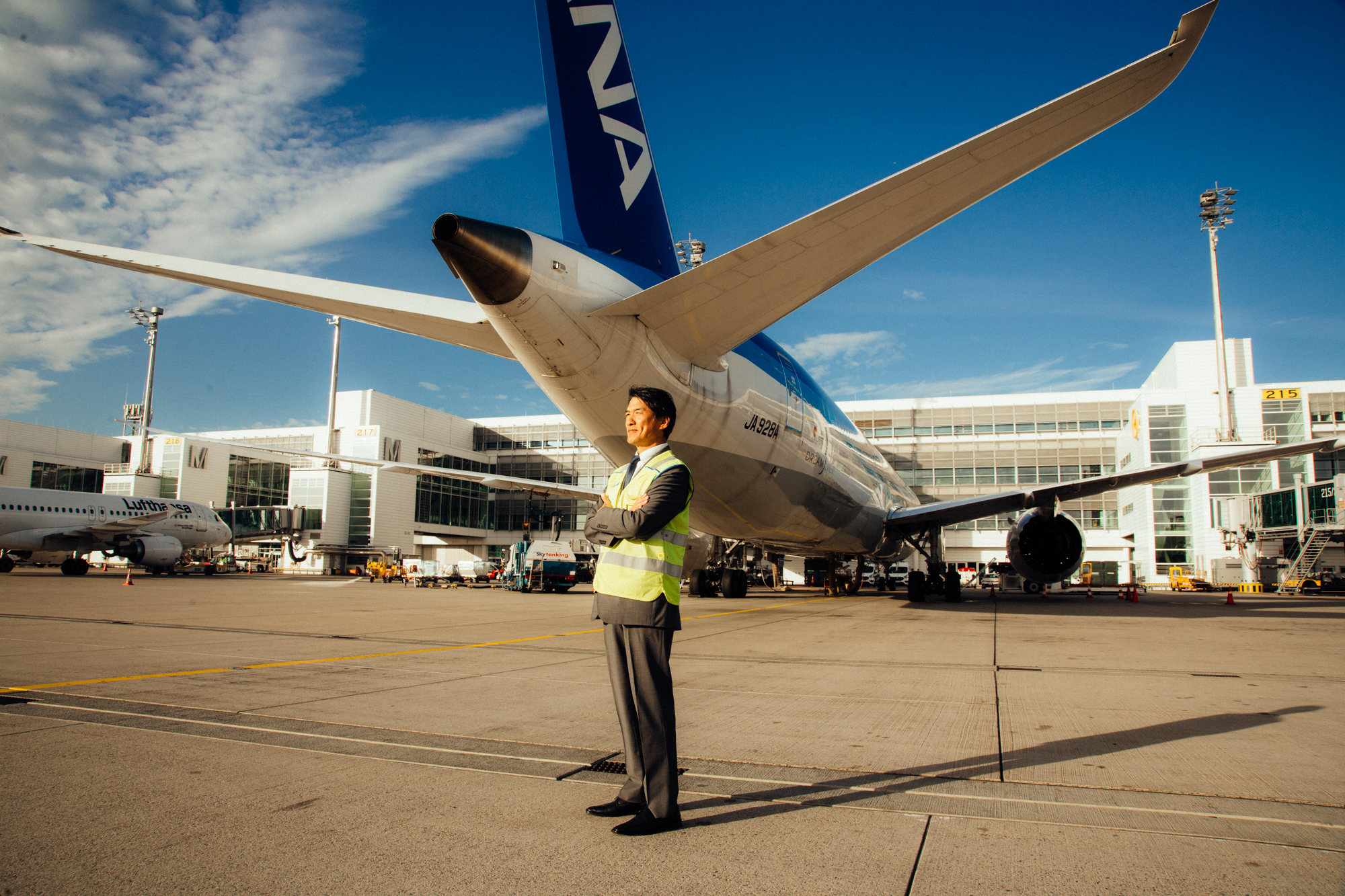In the late 1990s, Rakuten started its corporate journey in Japan. Over the past 25 years, a digital platform giant has emerged, operating globally with nearly 30,000 employees. We spoke with Toshihiko Otsuka, CEO of Rakuten Europe, about the almost 500-year-old source of inspiration for Rakuten, the global business with multiple platforms, the European and German expansion and the communication challenges of the company in Germany and Europe.
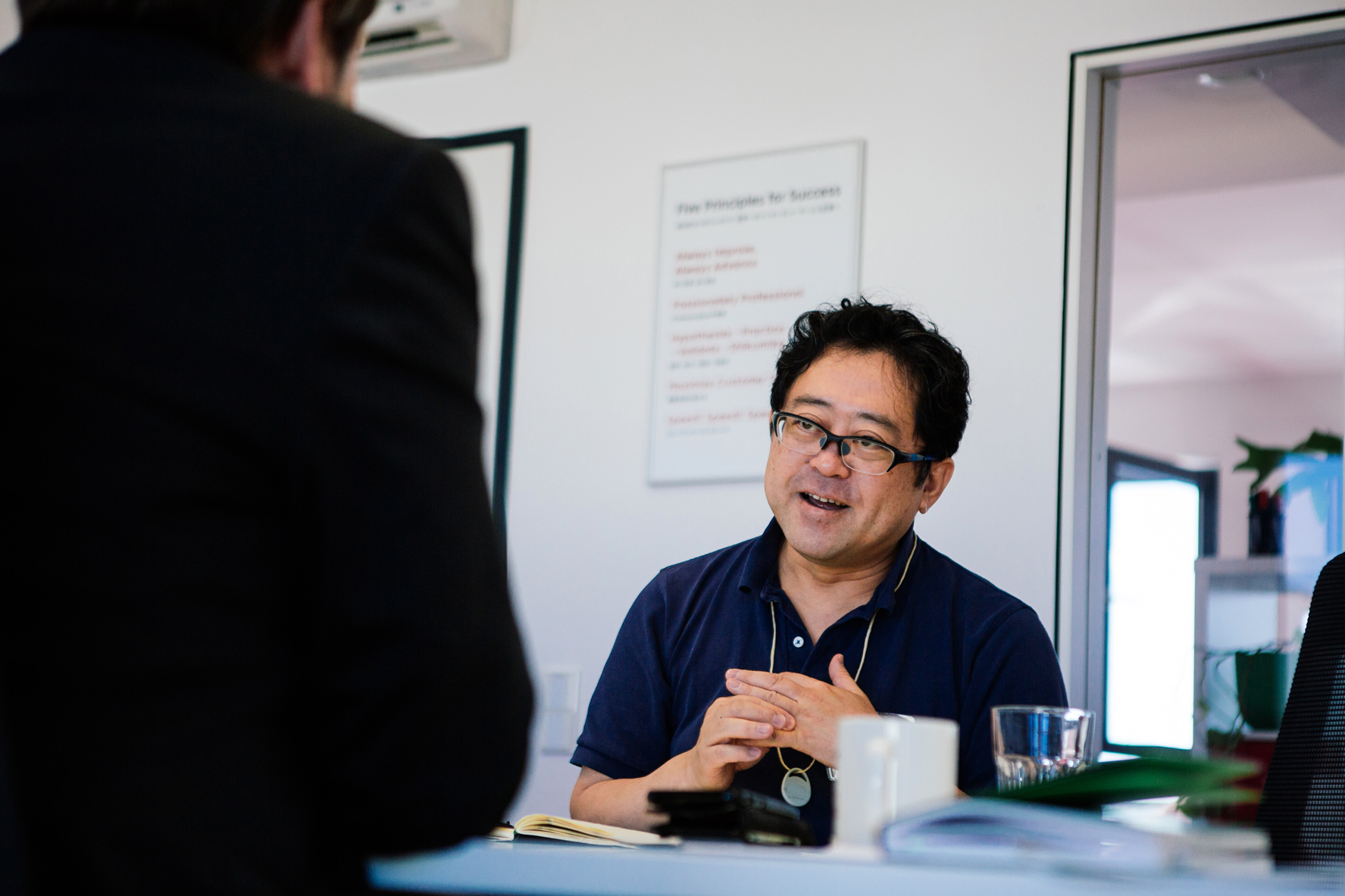
J-BIG: What do we need to know about Rakuten?
Toshihiko Otsuka: Rakuten is quite a unique company in Japan. We don’t come from the traditional production of goods, but are more of an online service company. As an online company, however, we do not have a monothematic approach, but are rather a conglomerate of approaches and services. We have offerings in e-commerce, fintech, in the streaming environment, in e-books, but also in sports. We try to integrate all of these in an overarching ecosystem – connected by our loyalty program “Rakuten Points”. Our goal is for customers to become members of this ecosystem and use it widely. We keep creating new offers for members and maintain customer relationships over the long term. That is the basic idea.
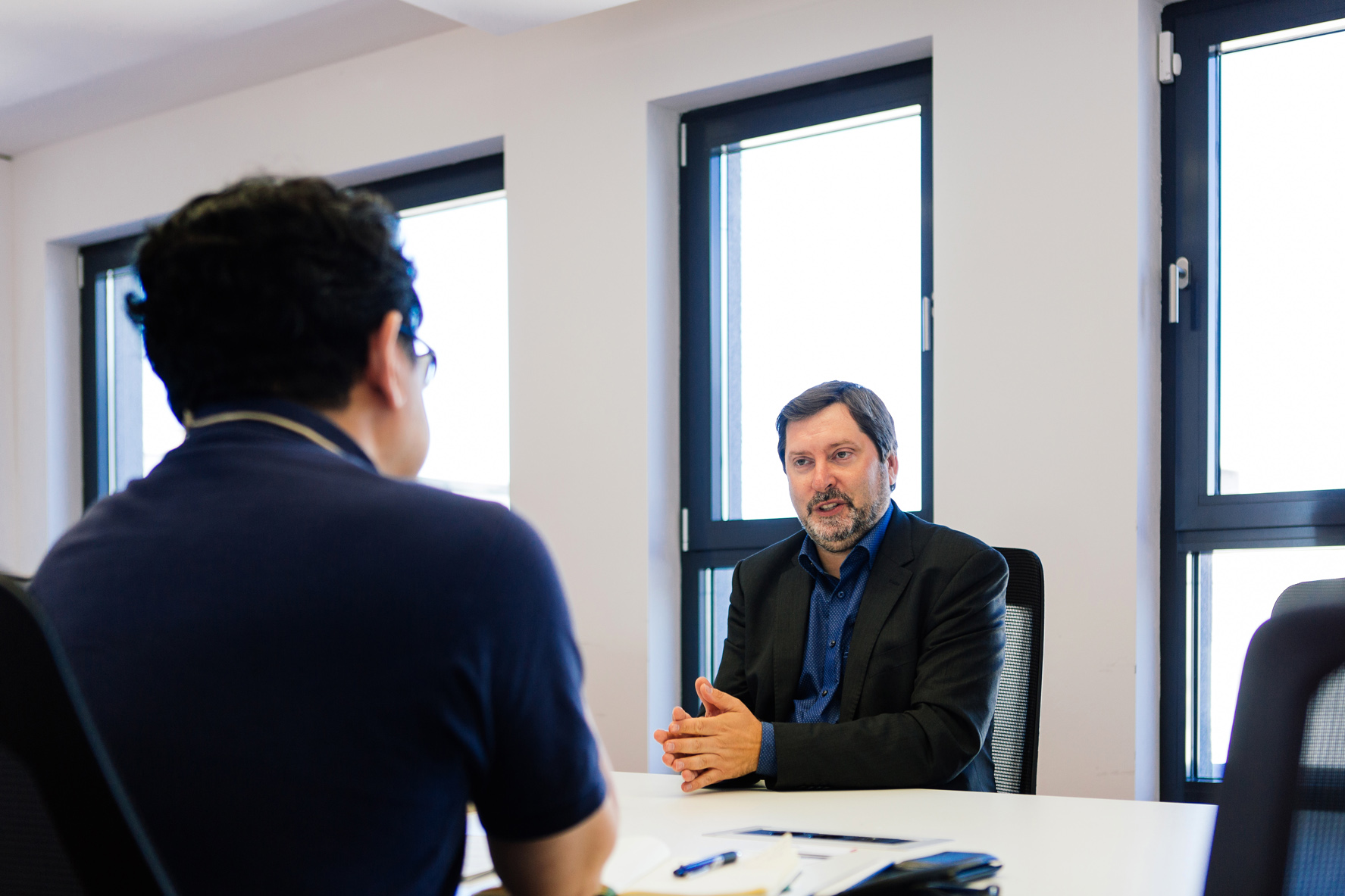
J-BIG: How did it all start with Rakuten?
Toshihiko Otsuka: In 1997, we started as an e-commerce company with an online shopping mall approach called Rakuten Ichiba. Then in 2000 we went public in the so-called “new economy” phase, just before the “internet bubble” burst. With the money from the IPO, we started to diversify. An internet travel agency was one of the first additions for us. We bought a company from the Hitachi Group, which later became Rakuten Travel. There were certain similarities between travel agencies and online shopping platforms from our point of view. We also bought a golf platform called Gora, which is now Rakuten Gora. So, step by step, we built a digital world around our shopping marketplace Rakuten Ichiba. Then, around 2002, we bought a slightly different company for the first time, which was in the online security business and became Rakuten Securities. And then we added fintech approaches – and we eventually bought an online bank where I was working at the time and turned it into the new brand Rakuten Bank. So we kept buying and building more portfolio companies – today the group offers more than 72 different services to consumers and businesses.
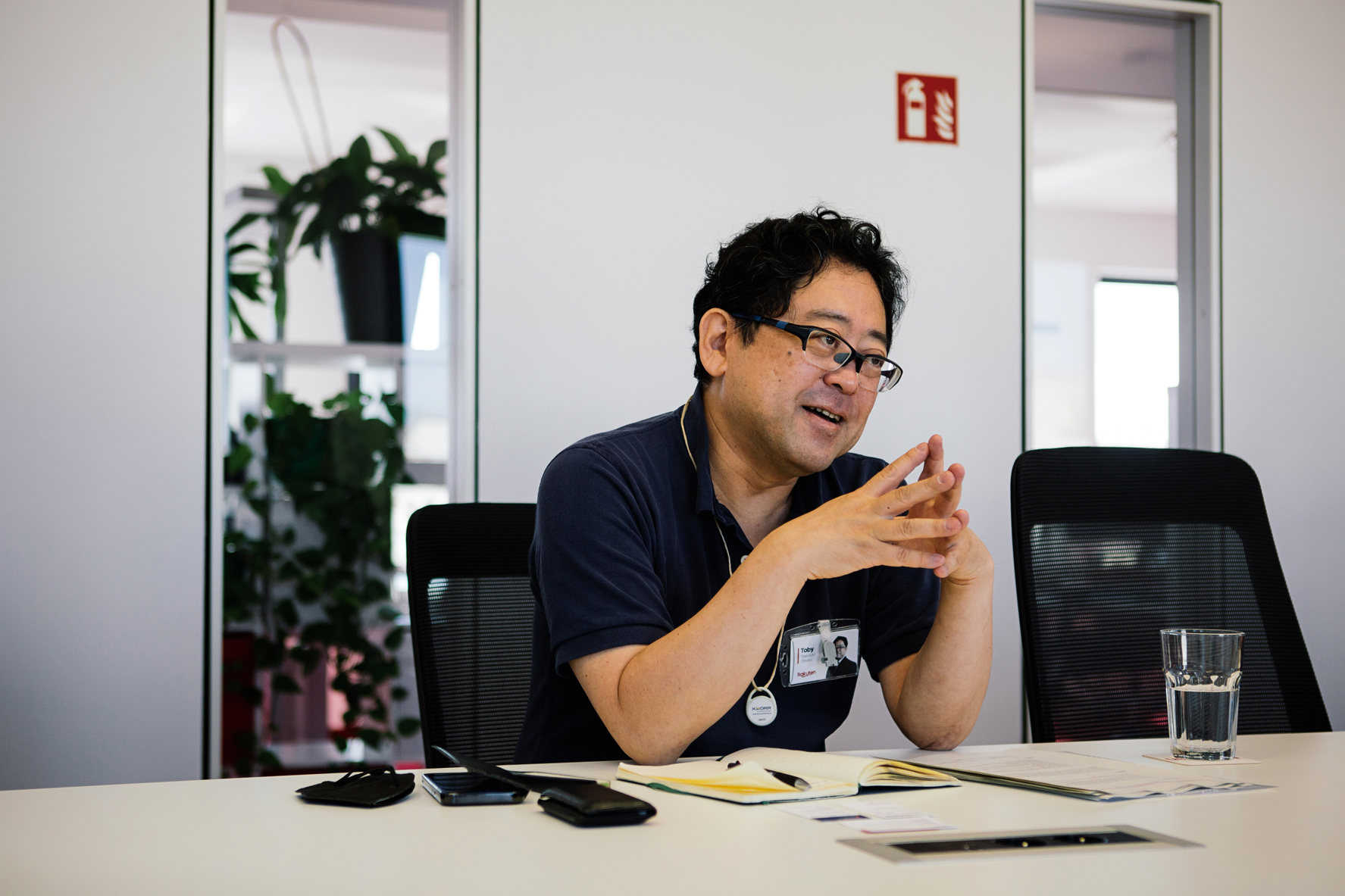
J-BIG: Was it the plan from the beginning to build this ecosystem?
Toshihiko Otsuka: It came about rather organically. We already had the idea of an ecosystem, but we didn’t know from the beginning exactly how it would look like and function. But we also made mistakes, such as buying a TV station.
So what is the bigger idea behind the ecosystem?
Toshihiko Otsuka: The bigger idea is to do something for society. Let me go back in history a little bit. There was a famous Japanese general in the 16th century called Oda Nobunaga, who almost dominated the whole country in a certain historical era. He had a castle and built a free marketplace around it. This free marketplace and the liberalisations behind it were called Rakuichi Rakuza – which translates as “free market”. Many people from all over Japan brought their goods to this market. Oda Nobunaga took a certain share of taxes for the transactions that took place there. Our founder Hiroshi Mikitani was very inspired by this very old idea. And so the name Rakuten was born, derived from this trade liberalisation called Rakuichi Rakuzu. But Oda Nobunaga did even more – he appeared as a sponsor of tea ceremonies, for example, supporting one of the founders of the tea ceremony – and thus spread the spirit of the special Japanese hospitality, Omotenashi – an inspiration for us as well. Because we consider Omotenashi to be one of the most beautiful aspects of Japanese culture. And we want to bring this to the world.
“Rakuten always wanted to be more like Ameyoko Shopping Street in Tokyo’s Ueno district. It’s a real marketplace where traders and buyers bustle. There’s shouting, it’s a bit chaotic, but you have fun buying. Often you don’t really know what you want beforehand. But then you find something that spontaneously appeals to you. There is a lot of inspiration. Our principle is to see shopping as entertainment.”
J-BIG: So you actually wanted to build a globalised and digitalised version of something very old and traditional, with all the philosophical thinking behind it?
Toshihiko Otsuka:Yes, exactly. From the beginning, our approach was different from that of Amazon, for example. With the big e-commerce competitors, it’s usually the case that they are like a product vending machine. You press a button and immediately get the product. Rakuten always wanted to be more like Ameyoko Shopping Street in Tokyo’s Ueno district. It’s a real marketplace where traders and buyers bustle. There’s shouting, it’s a bit chaotic, but you have fun buying. Often you don’t really know what you want beforehand. But then you find something that spontaneously appeals to you. There is a lot of inspiration. Our principle is to see shopping as entertainment. That’s something completely different from a product vending machine. In Japan, a large part of Rakuten Ichiba’s customers are female – they spend a long time on the pages and enjoy browsing and comparing. The male audience tends to prefer efficiency in shopping. Rakuten is about the experience. That is our core. Our success principles, the Rakuten Shugi, are also built on this. They are very Japanese, but in an online world version. We try to integrate these into our daily work.
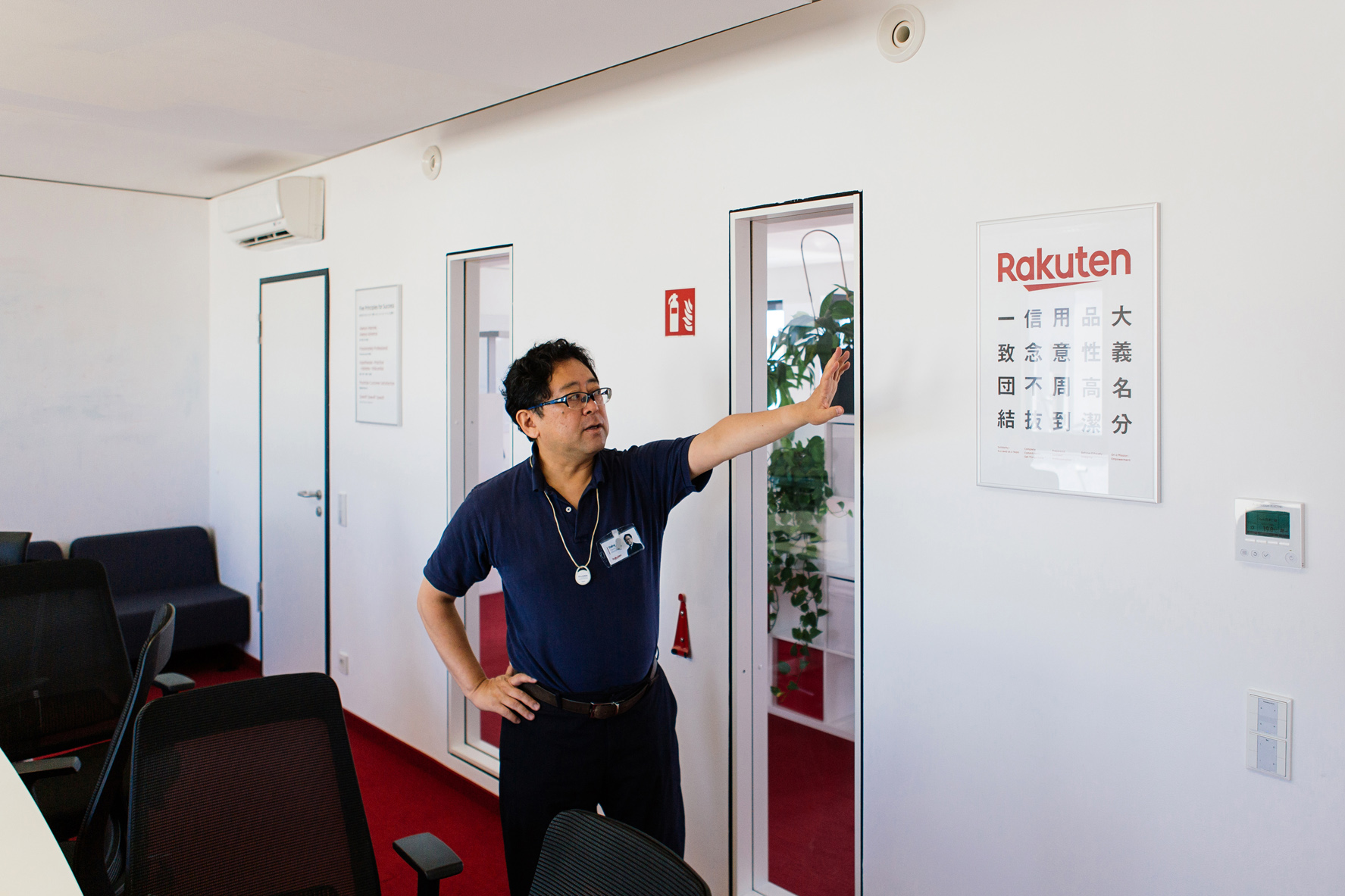
J-BIG:Can you give concrete examples of how you integrate your principles into your daily work?
Toshihiko Otsuka: For example, we have a weekly morning meeting, our asakai, which takes place from 8 to 9 am. All the employees in Japan attend this meeting in a very large room – other Rakutenians worldwide join virtually. In the first hour of the meeting, our founder Hiroshi Mikitani gives a 5 to 10-minute speech every week. Each time, he uses concrete examples to explain how our company principles affect our daily work. He tells about his own experiences and connects them to the Rakuten Shugi. This specification helps the employees a lot to be able to apply the abstract principles. So Rakuten is actually a very philosophical company. We are not just after money. Our mission is even more important to us.
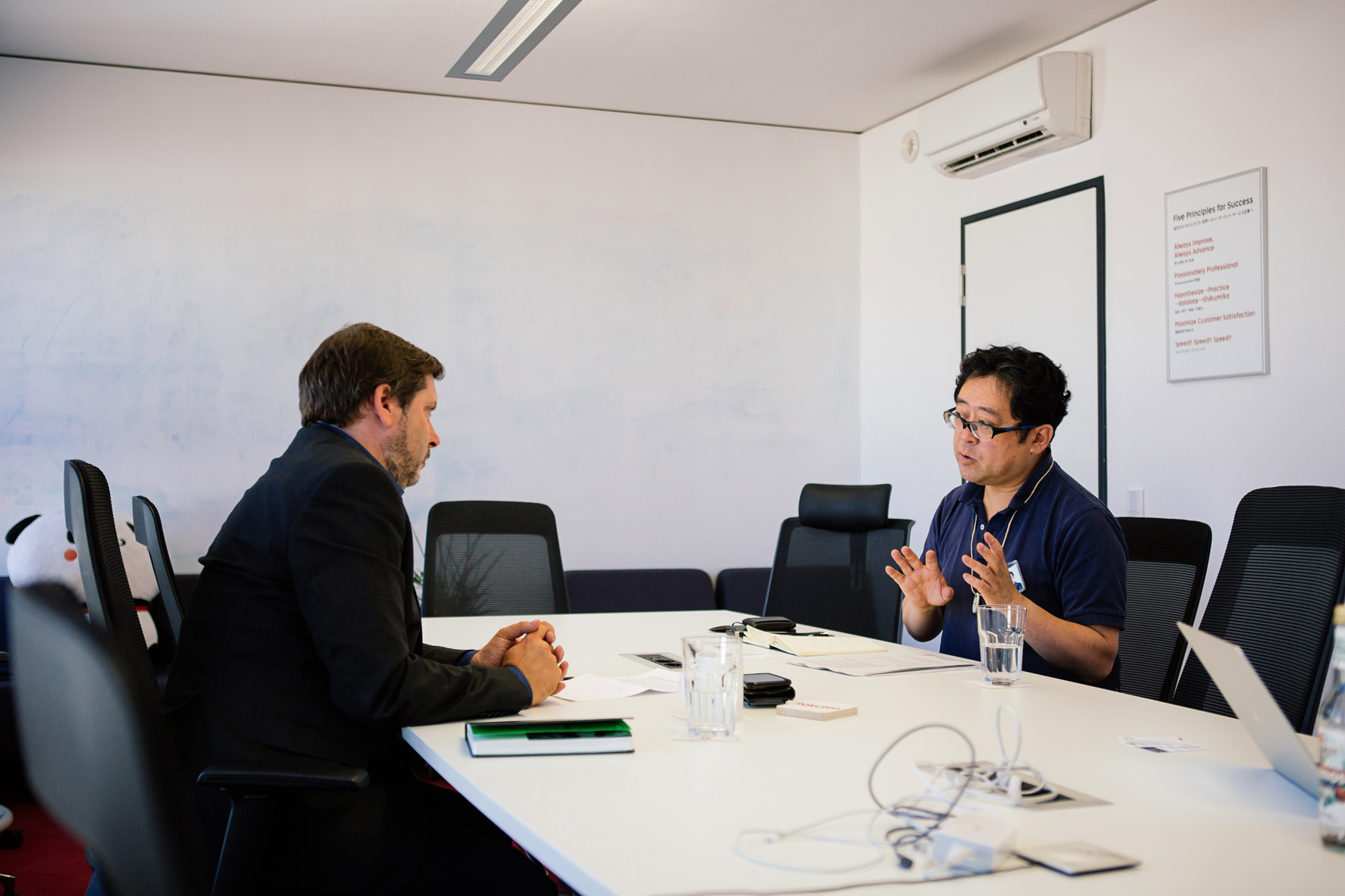
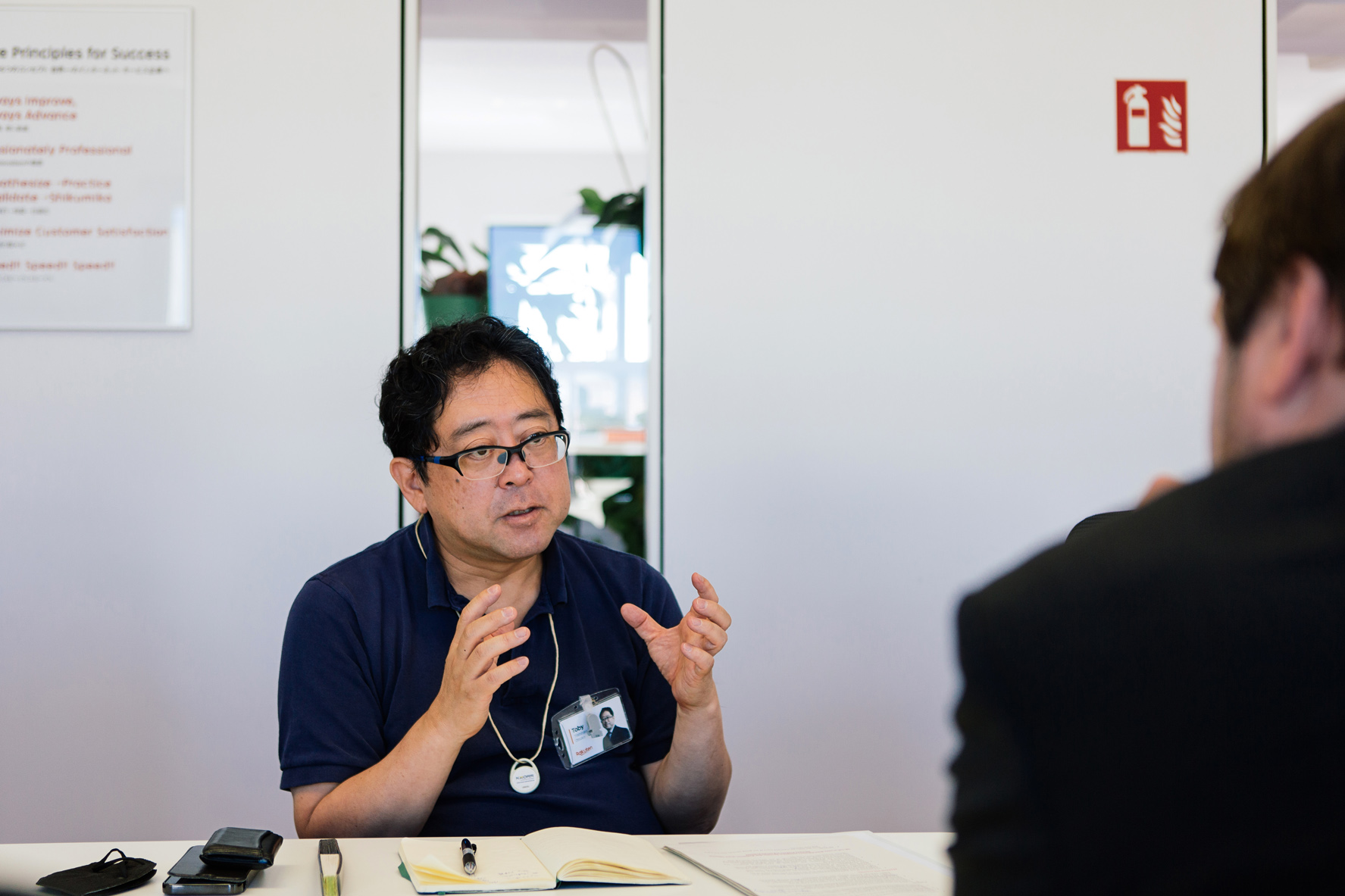
J-BIG: Let’s go back to the Rakuten ecosystem – how has it evolved in Japan and the world?
Toshihiko Otsuka: In Japan, we got 100 million members over time, which means that a large part of the Japanese are Rakuten members. Unfortunately, this number is declining slightly, which also means that there is actually little or no growth possible for us in Japan. We have done almost everything in the market and can really only grow by selling multiple services of the ecosystem to our customers. In the meantime, 76 per cent of our Japanese members use more than two of our offerings. Our focus is on different digital services – which are connected through our points program “Rakuten Points”. If you earn points on one service, you can use them on all other services. We’ve started exporting this model to the world in the early 2000s and today, this global ecosystem has more than 1.6 billion members.
J-BIG: The Rakuten Point system is very well known in Japan. How does it work exactly?
Toshihiko Otsuka: The first idea we had in 2002 was coupons. But that didn’t work out so well. That’s why we started the points system. You get points for certain transactions, which you can then use as a kind of virtual currency. This worked extremely well in the Japanese market – we came up with the approach a bit through trial and error. We then expanded the system so that users who use several services get more points for certain transactions than those who use fewer services. In the end, of course, it still pays off for us.
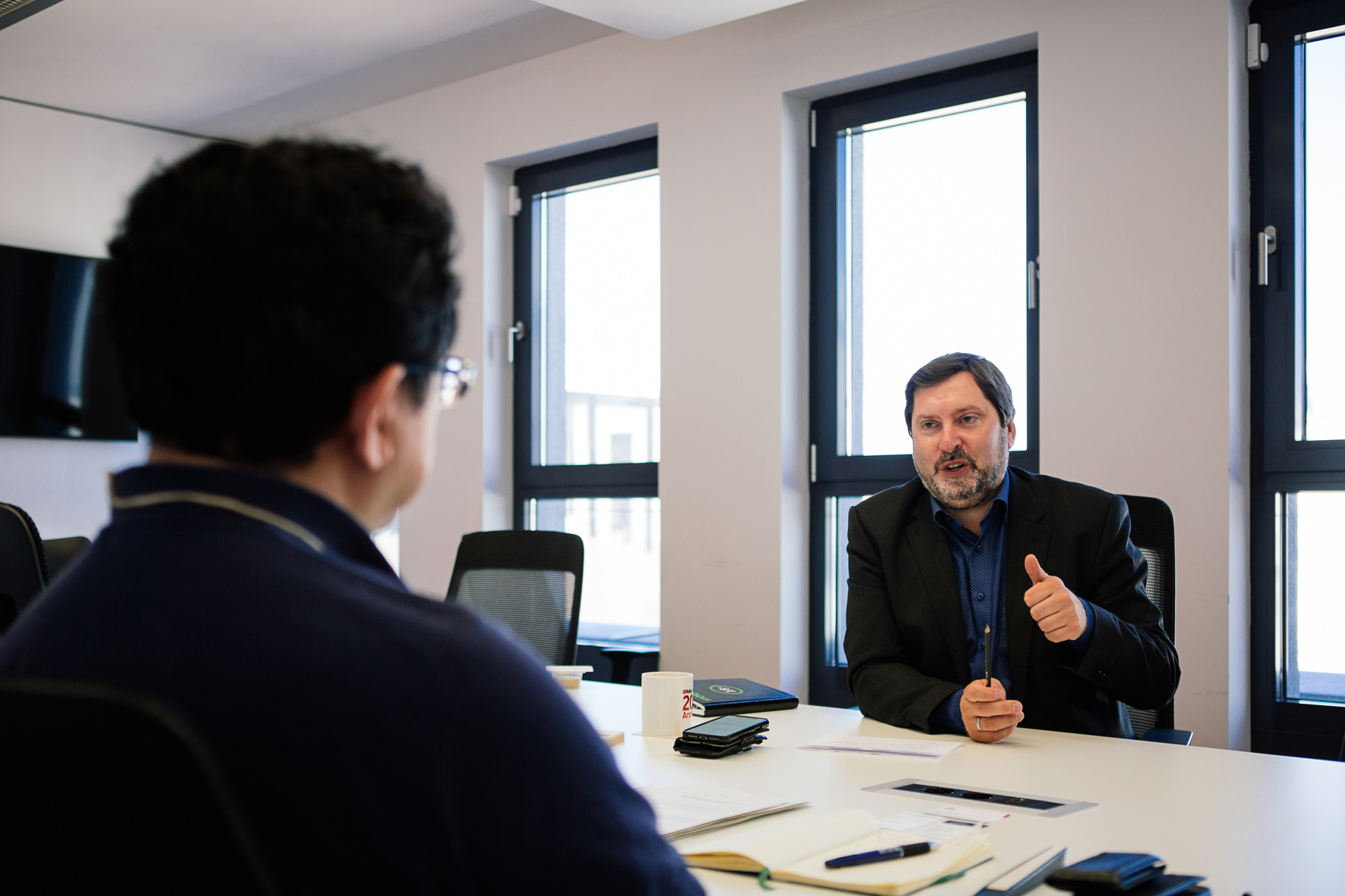
J-BIG: How did this approach become so popular in Japan? From the outside, the whole thing doesn’t seem so special. With Payback or similar approaches, there seems to be something comparable here in Germany …
Toshihiko Otsuka: Of course, there were customer programs in Japan before. But in the online sector, it was new. The points are also different from discounts or bundles. But in a marketplace-like ecosystem, it’s nice to have extra cash in the form of points that you can play with quite arbitrarily. It’s more of a gamification approach, which is also about having fun. But of course that’s not the right approach for everyone – some people would just like money back or a discount.
J-BIG: How could the very Japanese idea and model be transferred to the international market?
Toshihiko Otsuka: That is an important point. It is difficult! In the US, for example, the Rakuten Points approach didn’t work well at all – here we now have a cashback approach. Americans like cash. They want efficiency. Europe is somehow a mixture. And that’s why we also have a hybrid model here. For example, if you buy something from Rakuten Germany, you can choose whether you want cash or points. If you choose Rakuten Points, you get 20 per cent more than if you want cash.
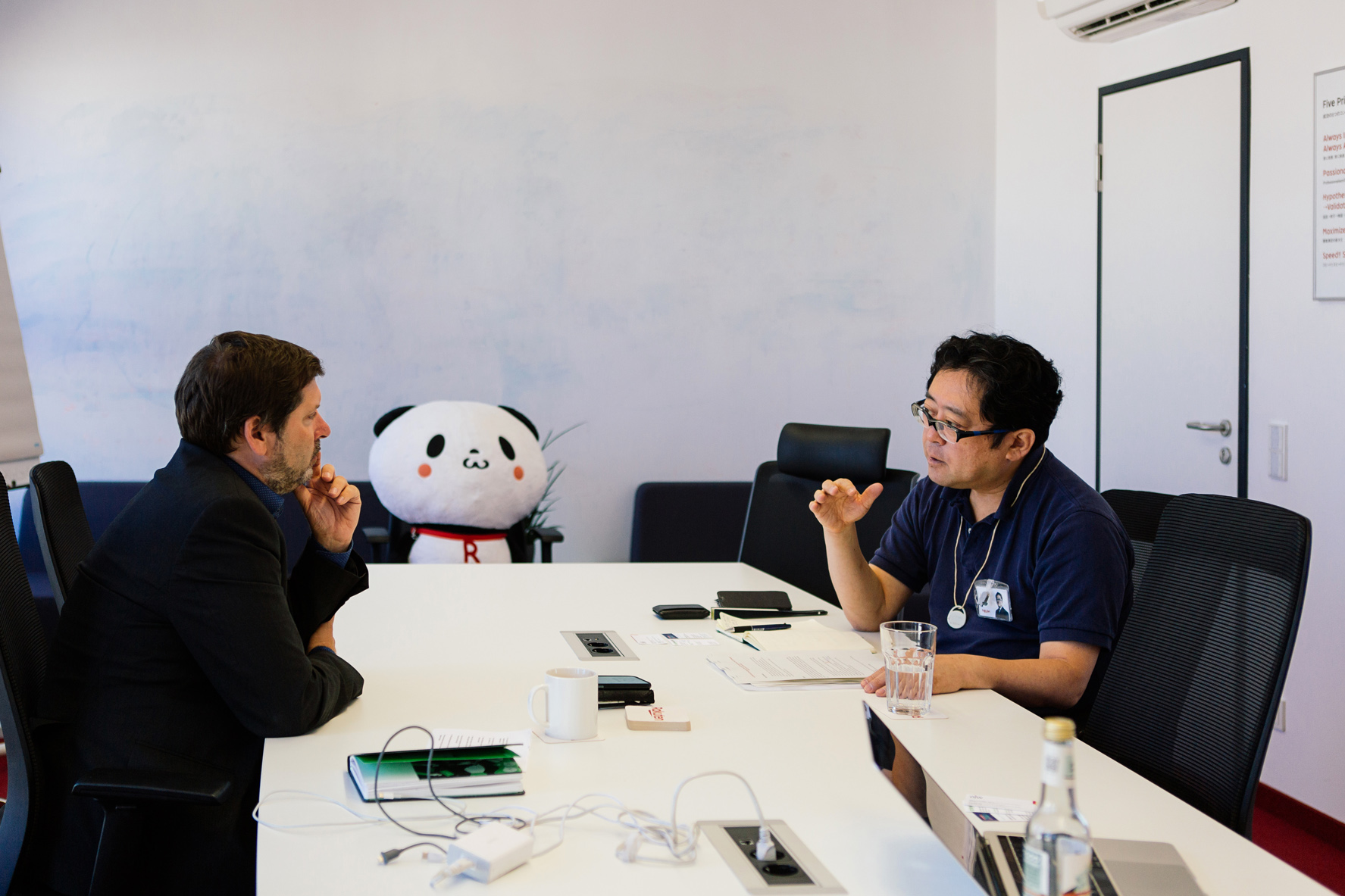
J-BIG: How and when did the international business start in the first place?
It started in 2005 when we took over the American company LinkShare – an affiliate marketing platform. Today, this division is called Rakuten Advertising – and is still leading in the digital marketing field. However, the purchase was a rather isolated activity. It really took off around 2010 when we became active in Europe and bought some e-commerce companies – including Play.com in the UK, PriceMinister in France – and also a small company called Tradoria in Germany in 2011.
When I myself joined Rakuten in 2009, I was once invited to Hiroshi Mikitani’s house on Saturdays. He would often get selected people together at the weekend and talk about books he had read. One of the topics was “globalisation”. We discussed how we could do it. And then we came up with the idea that in the future we should introduce English as the company language. Even for meetings and conversations that only take place among Japanese. Of course, that sounds a bit strange at first, but the idea was to get to grips with the foreign language. Because it is well known that many Japanese speak English badly. So we set high goals, such as achieving a certain score in English language tests. The whole thing was linked to staff salary progression – if you didn’t pass the test, you were more likely to get a reduced salary. I wasn’t sure if we could really do it, but our founder was very ambitious and we got hooked. Rakuten funded all the training and also allowed some employees to learn English almost full-time instead of working normally. But from our point of view, it was absolutely necessary because many Japanese companies failed in globalisation due to language and culture. We wanted to do better. And so we became an English-speaking Japanese company. Many big Japanese companies thought we would never make it work. But we did – and 95 per cent of the employees passed their test. That surprised us ourselves. There were even employees over 50 who had never had anything to do with English who mastered the task. The case caused quite a stir in the international business world. In the meantime, we speak English all over the world at Rakuten. So this is how we started our internationalisation.
“We had to change our path several times. But we always followed our mission.”
When we had achieved a high level in the English language, we started buying companies worldwide. Not everything worked out. We had to change our path several times. But we always followed our mission. So we got better step by step in Europe as well. A special feature is that we have a banking licence in the European market. With this, we can do a lot in our next steps. Our current portfolio here is different than in Japan. There, Rakuten Ichiba is our primary platform, which produces a lot of traffic. Whereas our European business consists of, for example, Rakuten France for the e-commerce business in France, Rakuten TV as a video streaming service in 43 European countries, the bank – and now we are also launching the new mobile technology platform. We are bringing our experience from the Rakuten Mobile business to the European continent as a platform provider. Our German cooperation with 1&1 is a big milestone in this. We are working very hard on this project to make 1&1 a leading mobile network operator with our experience. However, this is not an isolated activity. Of course, our existing ecosystem will also come into play here.
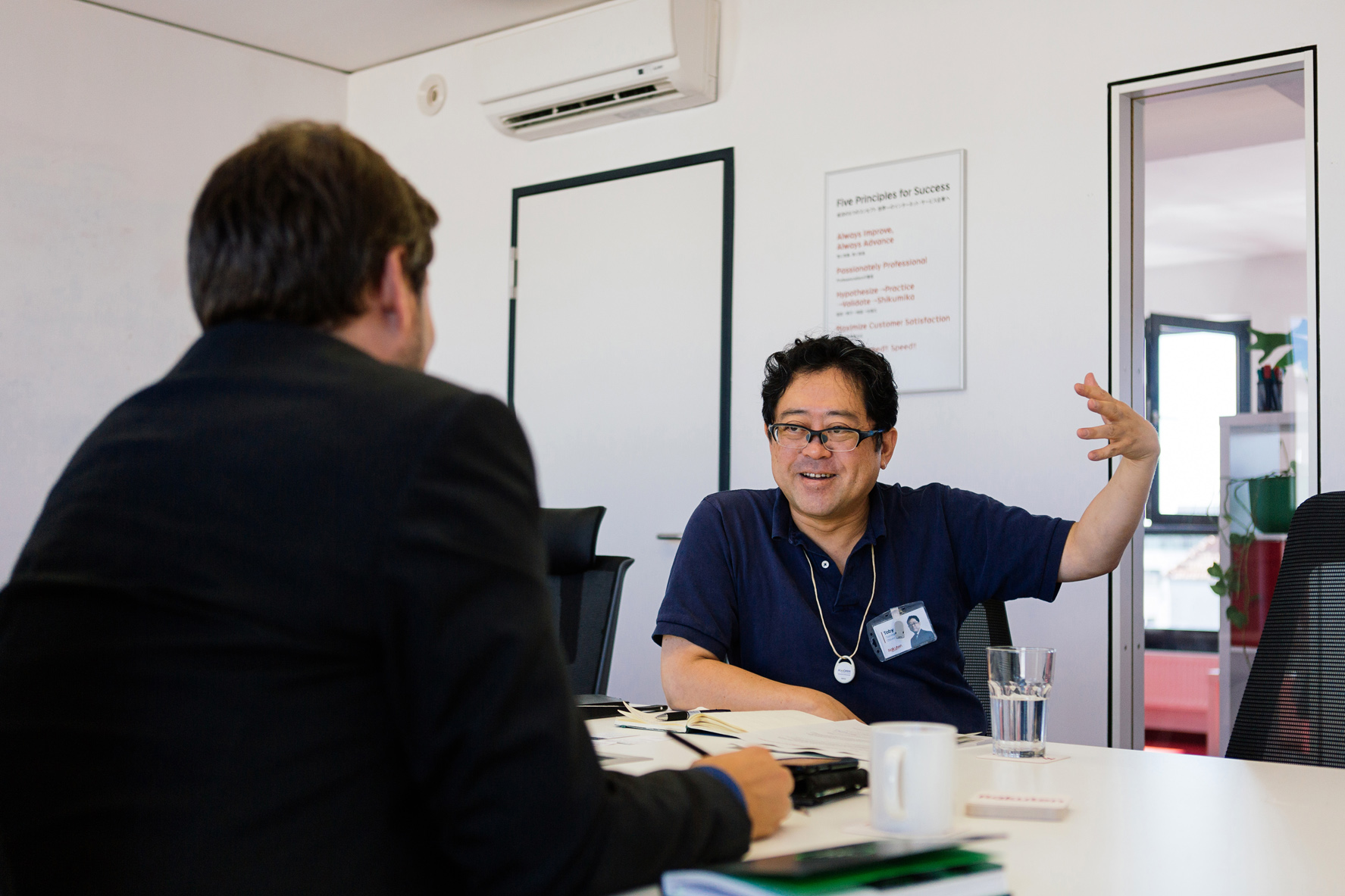
J-BIG: Let’s go into detail about the development of the German business. How has it developed since the beginning?
Toshihiko Otsuka: In 2011, we bought the Bavarian e-commerce company Tradoria. In 2012, we renamed the company Rakuten Germany. We introduced the loyalty program and Rakuten ID as a single sign-on mechanism. Rakuten TV, Rakuten Advertising, the e-reader Kobo and the messaging service Viber, which we had bought, also came to Germany later. We didn’t rename everything to “Rakuten XYZ” in the beginning, but when we started sponsoring FC Barcelona in 2017, we renamed all services to Rakuten because the brand awareness increased massively through the sponsorship.
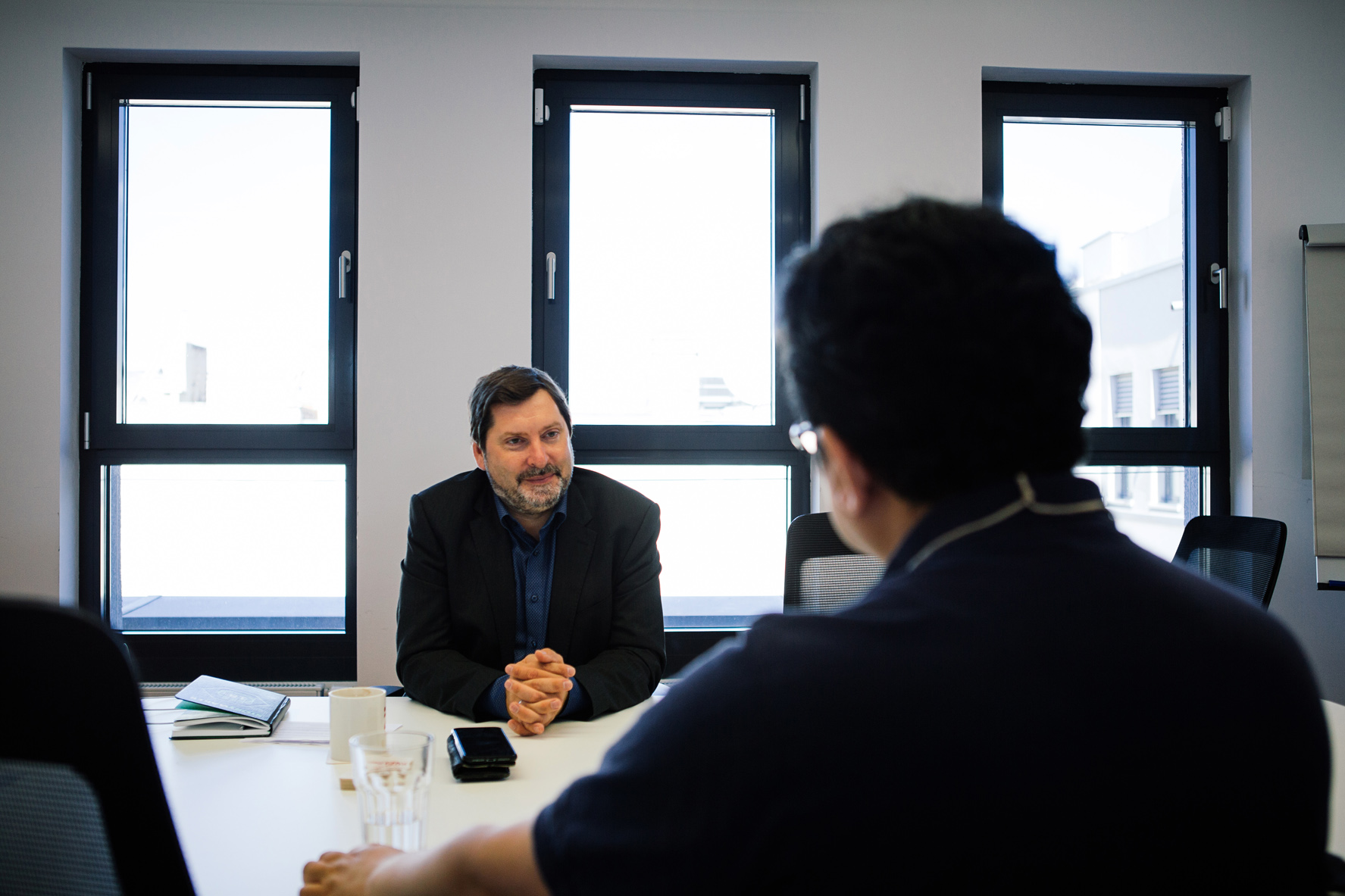
J-BIG: But there are still Rakuten services in this country that are not called “Rakuten XYZ”, for example the other e-reader: Tolino.
Toshihiko Otsuka: Yes, although Tolino is more of a consortium. We are mainly responsible for providing the technology and not 100 per cent responsible for everything. But that is actually an exception.
J-BIG: So the brand has become much better known. What needs to be done now?
Toshihiko Otsuka: Many end customers know the name by now. But what is still not clear to everyone is what Rakuten offers. That is our next task.
J-BIG: How would you describe Rakuten to the German end customer today?
Toshihiko Otsuka: Rakuten is a brand that makes life more entertaining. Customers need to understand that. I am not yet one hundred per cent satisfied with what we offer Europeans, but we are working on that at the moment. In general, it is important to understand that Rakuten is one of the few Japanese retail brands that play in different fields. Yes, Nintendo is well-known, but they are a pure gaming company. UNIQLO is another company that is becoming better known, but they are a pure retailer. The same may be true for MUJI. But we have a lot of businesses – not 70 like in Japan, but about 10. It’s not easy to reconcile that in terms of communication. That’s why we have to proceed step by step in communication. The next step will be to bind the Japan fans to us, manga and anime fans or gamers, for example. That’s why we partnered with the Japan Expo in Paris in 2022, for example. And we will certainly also participate in “Japantag” in Düsseldorf in the future – but we don’t know exactly when yet. Düsseldorf is definitely becoming more important. We now have a large office there.
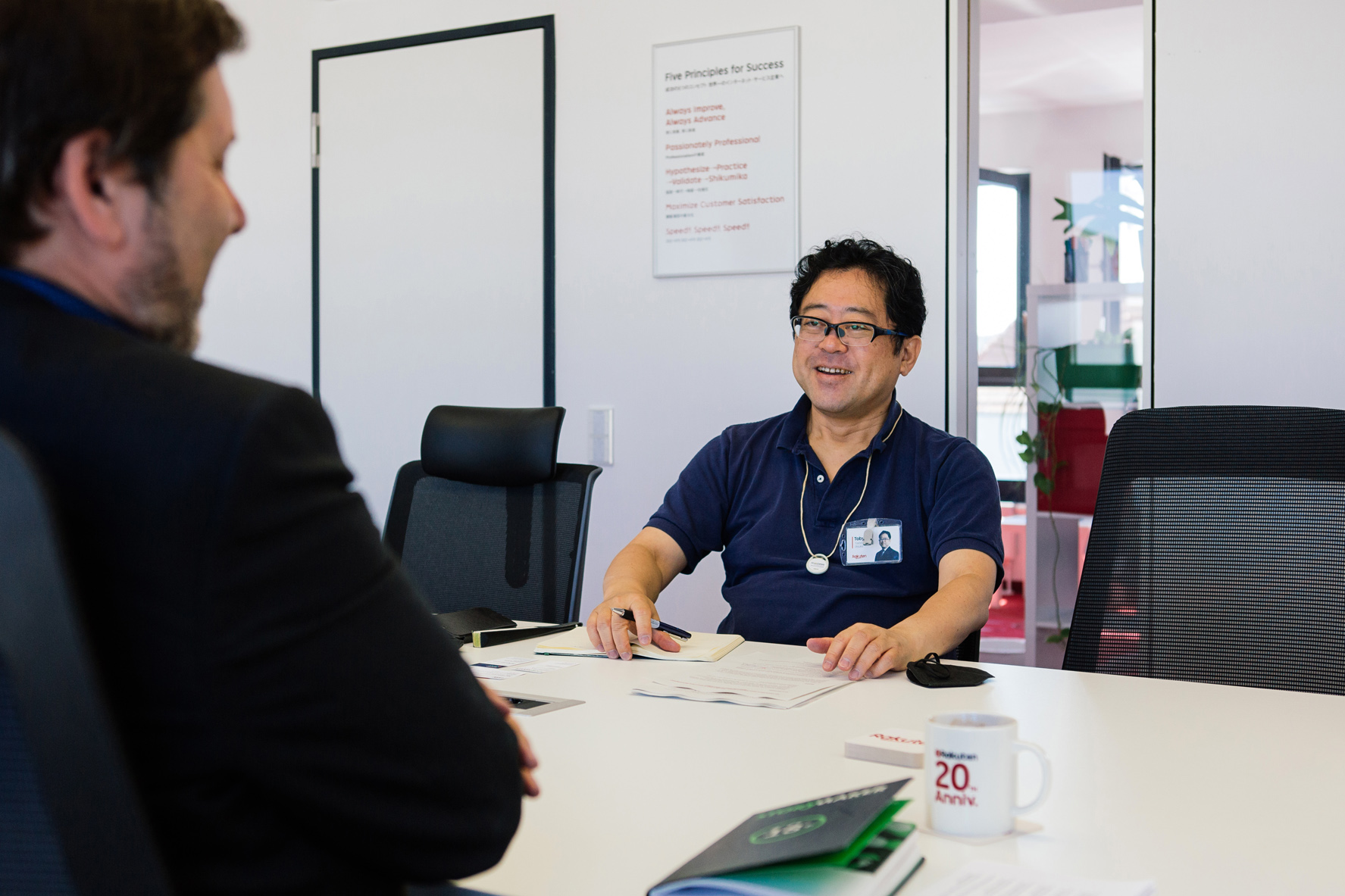
Kostenfrei abonnieren
„J-BIG – Japan Business in Germany“ ist das E-Mail-Magazin rund um die Aktivitäten japanischer Unternehmen im deutschen Markt. Registrieren Sie sich kostenfrei!
J-BIG: So Rakuten is a company with multiple business areas. What about the pure numbers: how many people work for the company in which countries? What is Rakuten’s turnover today?
Toshihiko Otsuka: We currently employ 31,000 people in 30 countries, including 6,000 developers from 70 countries. Our global transaction volume is 232 billion US dollars, our consolidated global turnover is 12.8 billion US dollars. And we are growing at a double-digit rate every year. We currently have 1.6 billion members worldwide.
J-BIG: What is the situation in Germany?
Toshihiko Otsuka: Our biggest office is now Düsseldorf, although we only just got started there. Then we have our office in Berlin and one in Darmstadt, where the Kobo and Tolino employees are based. A total of about 300 employees work at the three locations. On the turnover side, in Europe we are in the mid single-digit percentage range of total turnover. We are also growing at a double-digit rate in Europe. Germany and France are the largest markets and also our focus. Great Britain and Spain are also important for us.
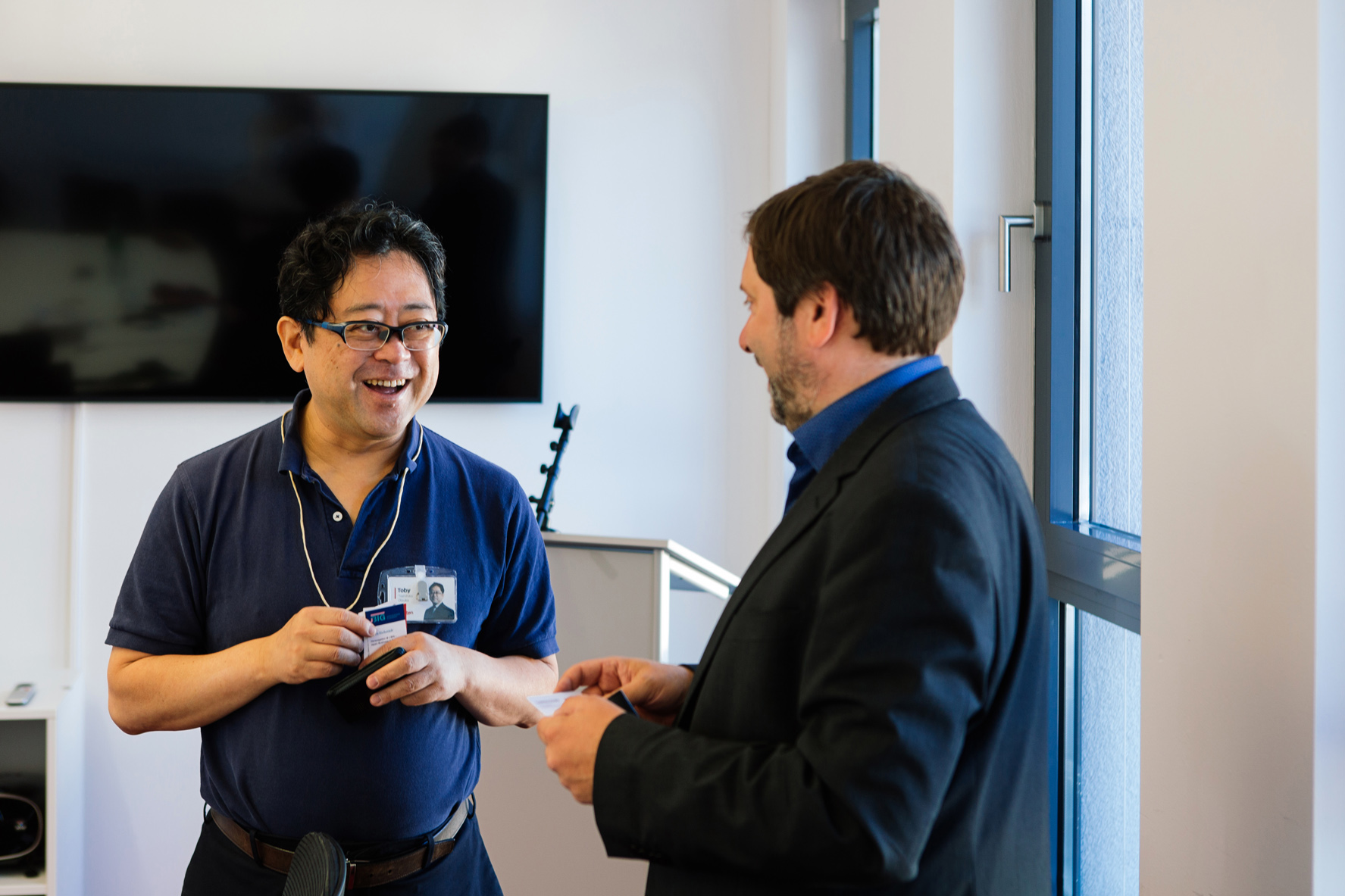
J-BIG: Tell us a bit more about the activities with 1&1, as this project is a big driver of the German business right now.
Toshihiko Otsuka: In Japan, we originally had the Rakuten Mobile service, as a virtual mobile operator. We were then offered bandwidth for 4G and 5G – because the ministry wanted to bring more competitors into the market besides NTT, Softbank or KDDI. So we decided to enter the market, because there is just a lot happening on the technological level at the moment. It was not an easy thing to do, but we now cover 95 per cent of Japan with thousands of our own mobile base stations. To implement this, we have built up a lot of know-how to construct the infrastructure – both in hardware and software. And our strength lies above all in the software, with which we have managed to invest significantly less in the hardware – and changes also run virtually only via the software. This has massively reduced the operating costs for the network – by almost 40 percent. With these insights from Japan, we have built up a great deal of know-how. This helps to implement a similar approach in Germany with 1&1. Many experts from Japan came to Germany in 2022 to work on the project. This also led to me filling out visa applications every day (laughs). So in the cooperation, we are not just an advisor, but actually implement the infrastructure. So there is a real Japanese-German cooperation here.
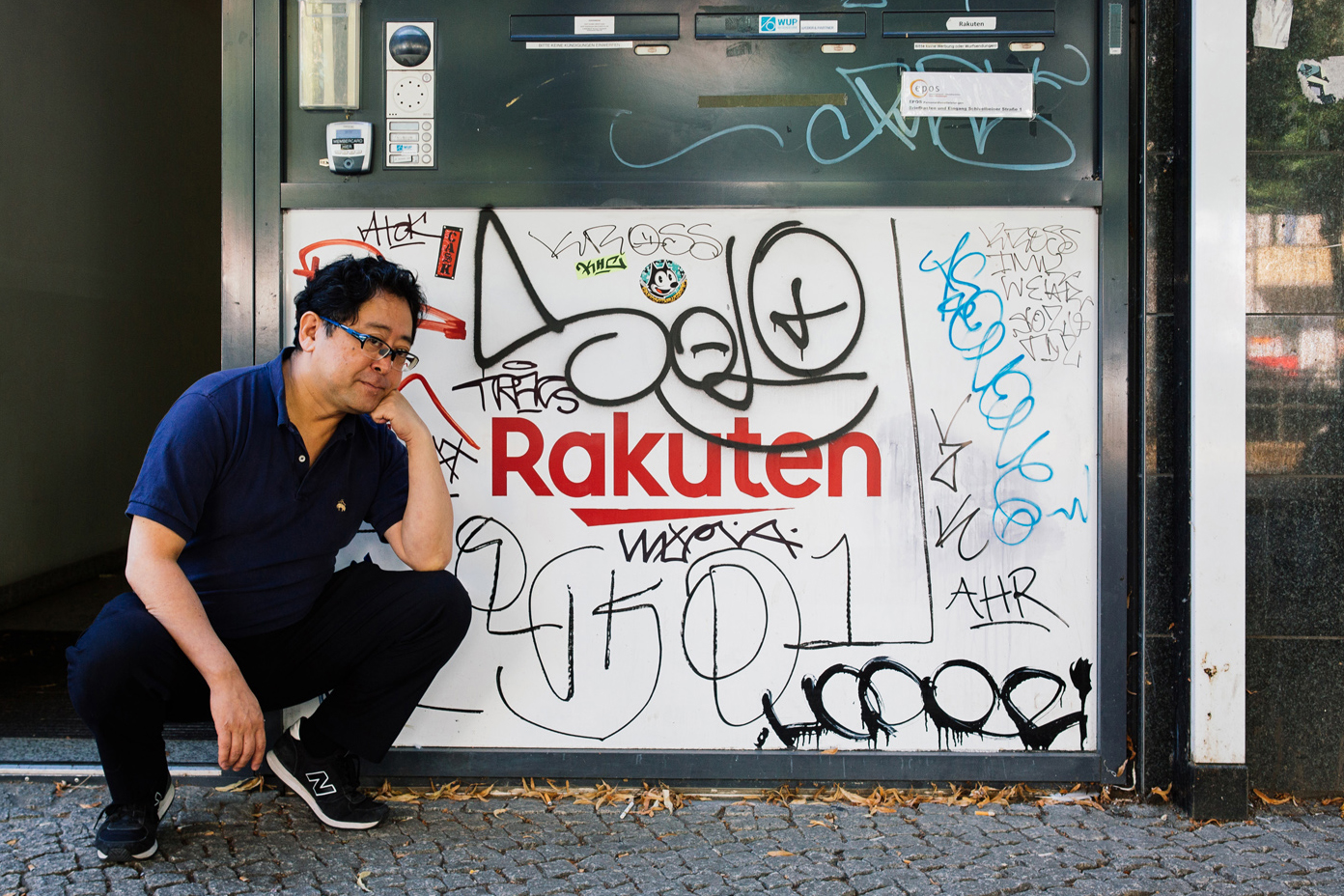
J-BIG: Apart from this project, how does the cooperation with the Japanese headquarters at Rakuten work?
Toshihiko Otsuka: Rakuten Points, Rakuten ID and other approaches like payment are global approaches of Rakuten. These are implemented locally everywhere. On the other hand, we continue to operate the local platforms that we have bought and integrated into Rakuten over the years. On the organisational level, cooperation between Japan and Europe is absolutely necessary. Our “English” strategy has helped extremely. Communication, at least at the language level, is actually excellent inside Rakuten. This is a real strength that we have compared to many Japanese companies.
J-BIG: Where is Rakuten heading in the future?
Toshihiko Otsuka: We will continue to work on making our customers’ lives more entertaining. To do this, we are taking one step at a time. And the whole business should also work sustainably – on the economical level, but also on the social level. Of course, we are also looking at issues such as better energy efficiency for the company as a whole. How we can become even greener is one of our major challenges and tasks.



